This story is part of My Queer Kitchen with Jennifer E. Crawford: Pandemic Edition, a cooking series promoting community, ingenuity and delectability during the time of COVID-19.
“One of the first things I did when we went into lockdown was plant seeds. For cacti and succulents. Why did I plant the seeds that take two months to sprout?!”
I’m talking on Zoom with chef Marissa Leon-John in Montreal, and she’s laughing, putting a hand to her forehead. Her laugh sparkles across the internet; it’s impossible not to laugh along with her. “So everyday I’m watering dirt,” she says. “Like c’mon, c’mon! Sixty days before I got a sprout. But I got a sprout!”
It’s this tenacity—pouring effort into growth and creating joy from scratch—that makes Leon-John so good at what she does. She is a MasterChef Canada alumni (season 5), like me (season 6). Seeing Leon-John’s unapologetically queer culinary excellence on TV helped embolden me to apply to the show. Since then, she’s steadily built a successful career as a private chef in Montreal—from private dinners to catering to cheffing for Fierté Montréal Pride. To see her Instagram is to drool.
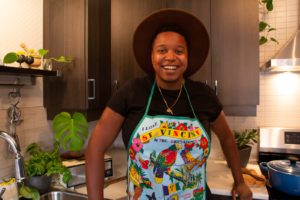
Chef Marissa Leon-John in Montreal joins Jennifer E. Crawford in their rural Nova Scotia kitchen... digitally.
I’ve switched things up a bit with today’s column. My Queer Kitchen is a place to explore food, feelings and queer identity. But I can only go so far when I fly solo—and who better to dig deeper than with other queer chefs? There’s nothing like cooking together, even if it’s only virtually.
I ask Leon-John how she’d describe the kind of food she most likes to make, and her answer is as thoughtful as her food. “That one’s tricky, but I always tell people the same thing though: Tell me what you love to eat. If you love to eat it, I will try to make you love it even more.” This answer is so good that I half-shout in joy, almost knocking my computer over, telling her: “What a perfect service-top orientation to food!”
Leon-John continues, laughing, “Yeah, that’s pretty much how it is! And that’s the joy I get out of it. Tell me what you love to eat and I will blow your mind. The joy I get is hearing people in the background, like ‘Ooh, mmm! Did you taste that?’ That’s how I win. If you can find a little bit of joy in your day, and it’s from a bite I gave you, ooooh! That’s when I get goosebumps.”
“That’s how I win. If you can find a little bit of joy in your day, and it’s from a bite I gave you, ooooh! That’s when I get goosebumps.”
Leon-John’s main game up until a few weeks ago was creating those oohs and ahhs at private dinner parties, hosted in people’s homes.
“But in the blink of an eye, that went out the window,” she says. “And I started having people reach out to me, saying, ‘Hey, all of a sudden I’m at home. I have to cook three meals a day and snacks, and I don’t know what to do!’ And I wanted to help.”
Not wasting a minute, Leon-John launched her quarantine delivery menu. “I posted the menus on Instagram and the response was tremendous—and from queer families I don’t even know. They found me through Instagram, Facebook.
“Honestly, before this, my bread and butter was often white, middle-class, very hetero clients. And they’re great, I love them.” She furrows her brow for a quick second, and continues: “This has given me more visibility and a representation-matters type of feel. And it’s all coinciding with everything that’s happened in the last, let’s say, four weeks across North America and worldwide. Supporting Black business, and also queer Black businesses, and queer Black entrepreneurship. Up until a few weeks ago, I wasn’t seeing too many other people looking like me doing what I do.”
The conversation turns to Pride this year, and I’m curious if Leon-John has any plans. In 2018, she was the chef for Fierté Montréal Pride, delighting thousands with her food.
“I’m just trying to get my food out to as many queer people as I can. I’m just like: Tell all your friends! I’ll feed you!
“Everything that’s going on right now—all the communities are coming together. It’s a giant cookout at this point. Everyone’s in it. The Black Lives Matter movement, we’re fighting police brutality, we’re fighting for Indigenous rights and it’s Pride month,” she says. “My social media right now is flooded with two things: So many rainbows and slogans of like, ‘Let’s keep fighting, and let’s work together.’ And those two things combining forces?! I’m ultra proud. I’m just trying to cook, keep people happy and add to that fire, making the contribution that I can make.”
We’re both nodding enthusiastically through our screens at each other as we talk about how Pride and fighting for justice are not mutually exclusive. “They’re hand in hand, one and the same,” Leon-John says, intertwining her hands to demonstrate the inextricability. Which leads me to ask how and if her queer identity comes to bear on the beautiful food she creates. Her bright laugh of acknowledgement lets me know I’m in for a doozy of an answer.
“How can it not? Let’s be real!
“Because I make food that appeals to who specifically wants it, it’s sometimes queer food, sometimes kinda not. But because of who I am, I feel my queerness just falls out into any space I’m in, because seriously, how can it not?” Again, she laughs, her hands gesturing to an imagined queer confetti exploding around her. “How I view myself as a queer cook has everything to do with just my presence. And my being in this industry.
“I’ve had to constantly prove I’m not an anomaly. Or maybe I am, but I’m going to be the biggest, baddest, best, wildest anomaly, so they can’t turn me away. That’s kind of how I’ve had to approach almost everything in life. ‘Cause there’s always been that, ‘Oh, you’re a woman. And you’re Black? Oh, you’re queer too?! What? Oh my god.’” She mimics someone’s mind being blown, coupled with her gentle laugh.
“I’m all of those things. And more. Come and get it. I have a place here.”
If you want to experience the magic that is Marissa Leon-John’s presence and food, the quarantine delivery menu is presently wrapping-up as restrictions are eased in Montreal. Your best bet is to reach out to her directly via DM on Instagram, or through the contact page on her website. For the rest of us, we can recreate a little of her magic at home. What I really love about the following recipe is how, with a little love and effort, it transforms ordinary ingredients into something really extraordinary.
Marissa Leon-John’s pork dumplings
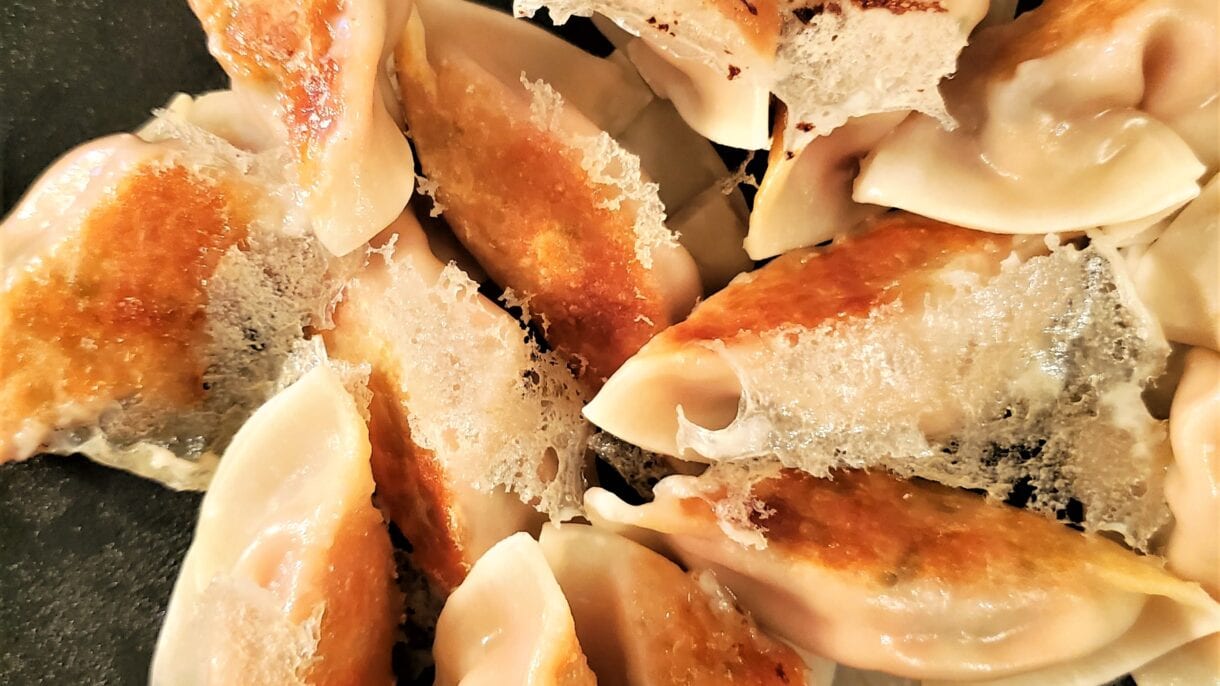
Delicious dumplings from Montreal chef Marissa Leon-John. Credit: Courtesy Marissa Leon-John
I’m pretty confident that I’ve eaten my weight in dumplings, maybe more. They are one of my favourite comfort foods and an instant go-to when looking for a takeout fix.
Once, I went to one of my favourite Chinese dumpling spots in Montreal and, after devouring a couple dozen, asked my waiter if I could see how they were made. He was more than happy to oblige, so I got a tour of the kitchen and just watched as these aunties with lightning quick hands filled and folded faster than I could say, “How did you do that?”
This recipe is how I recreated that magic; it’s foolproof for making pork dumplings at home. Don’t be intimidated by the length of the recipe. There are a few steps but they are all very simple and straightforward. As always, I recommend that you prep all of your ingredients and get your assembly station set up before you start. Go through the ingredient list, chop everything up and place it in front of you. This will make everything go smoothly!
Also, If you don’t eat pork, you can substitute with any ground protein you like. Ground chicken or turkey make great alternatives.
Ingredients
1/2 medium head napa cabbage (about 1 pound)
1 tbsp kosher salt
1 pound ground pork
1 bunch scallions, thinly sliced (about 1 cup)
1 bunch cilantro (coriander), minced (about 3/4 cup)
3 tbsp soy sauce
2-inch piece fresh ginger, peeled, grated or minced
2 tbsp sesame oil
2 large eggs, whisked
1 (12-ounce) package round dumpling wrappers
Yields approximately 80 dumplings
Method
- Cut cabbage in half lengthwise, then slice each quarter into very thin strips. Avoid the core. Toss cut cabbage with salt in a large mixing bowl then let it hang out for about 10 minutes.
- When your 10 minutes are up, grab handfuls of the cabbage and squeeze out the excess water. Throw your squeezed cabbage into another mixing bowl.
- Combine the cabbage with the rest of the filling ingredients. In the bowl with the squeezed cabbage, add the ground pork (or preferred protein), scallions, cilantro, soy sauce, ginger, sesame oil and eggs. Now get dirty and mix it all up. You want to use your hands for this to make sure everything is nicely combined.
- Arrange your dumpling-making station. Clear a large space on the counter or a table. Set out a small bowl of water, the bowl of filling and a parchment-lined baking sheet nearby. Open the package of dumpling wrappers and arrange a few on the work space in front of you. I like to use a large cutting board.
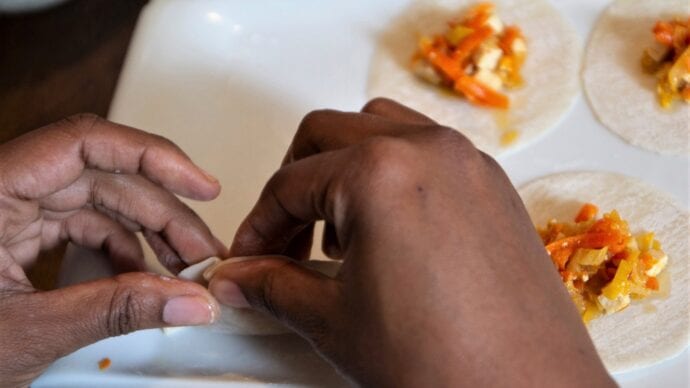
Making the pleat, to seal. Credit: Courtesy Marissa Leon-John
- Place 1 tbsp of filling on each dumpling wrapper. Dampen the edge of the wrapper with water. Fold the dumpling in half. To seal along the open edge of the folded dumpling: Use your thumbs on opposite sides to fold a tiny pleat on either side, then press firmly to seal the dumpling closed. You may need to dab a little water under the pleat to make it stick closed. Repeat with all the wrappers and filling. (If not cooking right away, you can freeze the dumplings on a parchment-lined baking sheet. Once frozen solid, toss them into a freezer bag or container and keep for up to 2 months.)
- To cook, put a little oil in a skillet and heat on medium. Place as many dumplings as will fit in the pan without touching each other. There should be a little sizzle. Let them cook for about 3 minutes. Then pour ¼ cup water into the pan—big sizzle—cover and let steam for about another 2 minutes. When cooked, the wrappers will be almost see-through and noodle-like and your filling will be warmed all the way through. Repeat as needed.
- Transfer the cooked dumplings to a plate and serve with soy sauce or other dipping sauce. My personal favourite is some ponzu (citrus infused soy sauce) and spicy peanut sauce!
—Marissa Leon-John
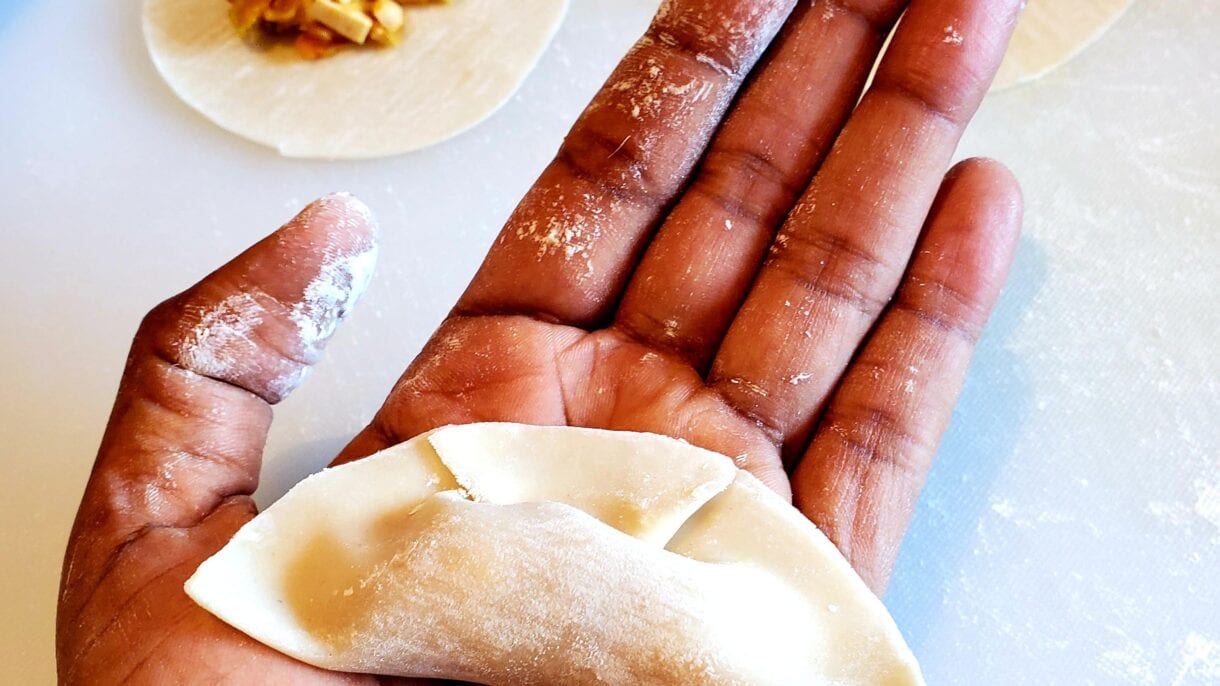
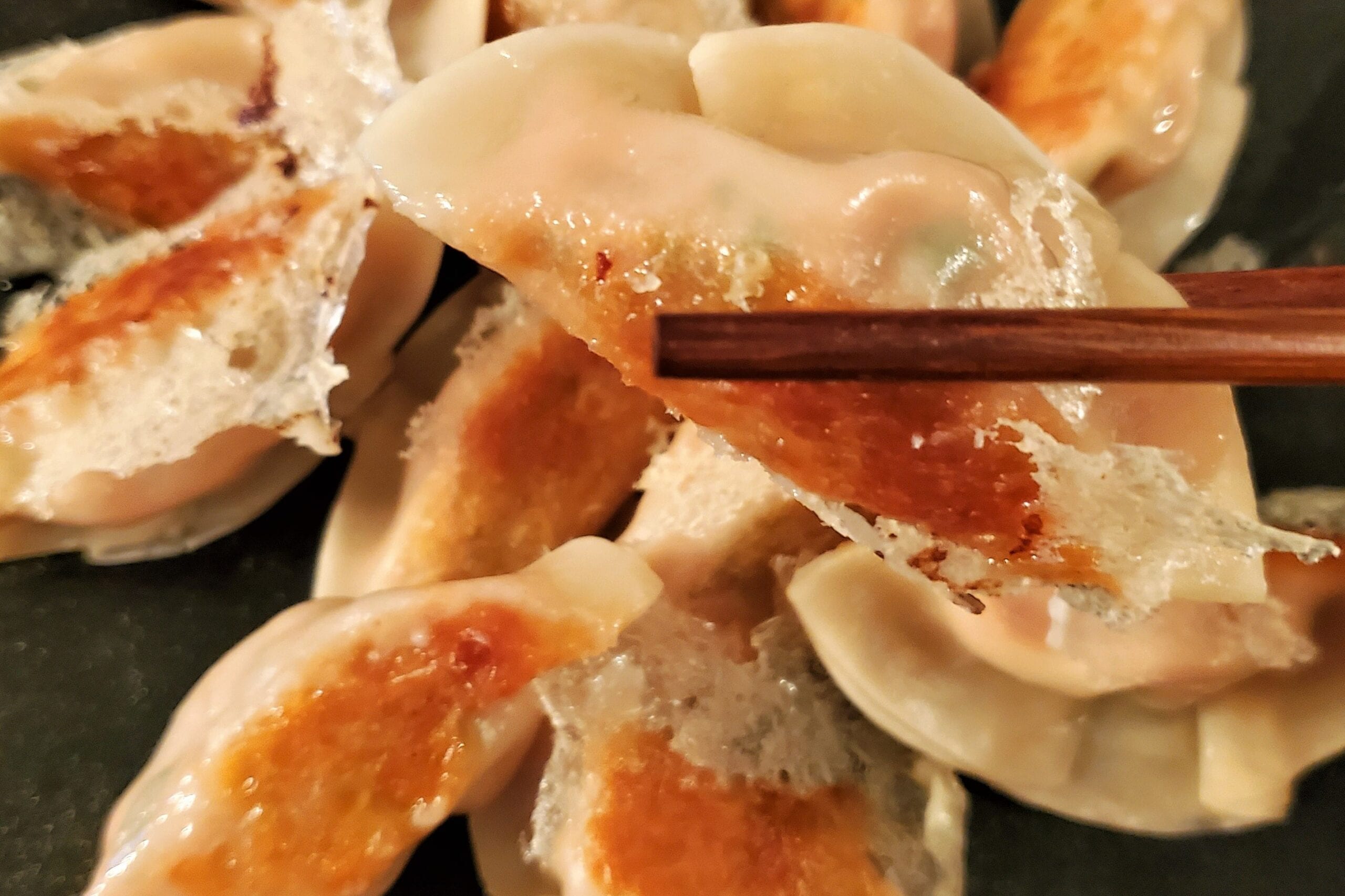

 Why you can trust Xtra
Why you can trust Xtra


